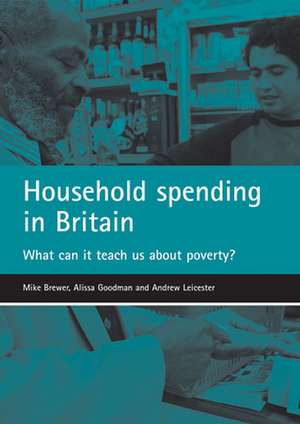Household spending in Britain – What can it teach us about poverty?
Autor Mike Breweren Limba Engleză Paperback – 18 apr 2006
Much of the recent policy debate surrounding poverty in Britain focuses on income as a measure of living standards. In this report we consider one alternative to income for measuring poverty that has been largely overlooked in the mainstream poverty debate in the UK: namely household expenditure. Economic theory suggests that household expenditure is an important measure of financial well-being. Using 30 years of data from household surveys, this report shows the trends in poverty in Britain since the 1970s when household expenditure is used as a measure of financial well-being, rather than household income and investigates how using spending, rather than income, as a measure of well-being alters our view of who is poor. It examines the spending levels of the lowest-income households and analyses whether low-income pensioners' spending on basic and non-basic items increased as a result of the large increases in entitlements to means-tested benefits since 1999.The research will be of interest to civil servant policy-makers, academics and researchers working on poverty issues, and other groups with an interest in anti-poverty policies.
Preț: 172.28 lei
Nou
Puncte Express: 258
Preț estimativ în valută:
32.97€ • 34.51$ • 27.44£
32.97€ • 34.51$ • 27.44£
Carte indisponibilă temporar
Doresc să fiu notificat când acest titlu va fi disponibil:
Se trimite...
Preluare comenzi: 021 569.72.76
Specificații
ISBN-13: 9781861348548
ISBN-10: 1861348541
Pagini: 48
Dimensiuni: 210 x 297 x 5 mm
Greutate: 0.21 kg
Ediția:New.
Editura: Bristol University Press
ISBN-10: 1861348541
Pagini: 48
Dimensiuni: 210 x 297 x 5 mm
Greutate: 0.21 kg
Ediția:New.
Editura: Bristol University Press
Notă biografică
Mike Brewer, Institute for Fiscal Studies, Alissa Goodman, Institute for Fiscal Studies and Andrew Leicester, Institute for Fiscal Studies
Cuprins
Introduction
Income and expenditure poverty compared
Income and expenditure behaviour of the same households
The effect of increased benefit entitlements on pensioner spending
Conclusions and policy implications
Income and expenditure poverty compared
Income and expenditure behaviour of the same households
The effect of increased benefit entitlements on pensioner spending
Conclusions and policy implications
